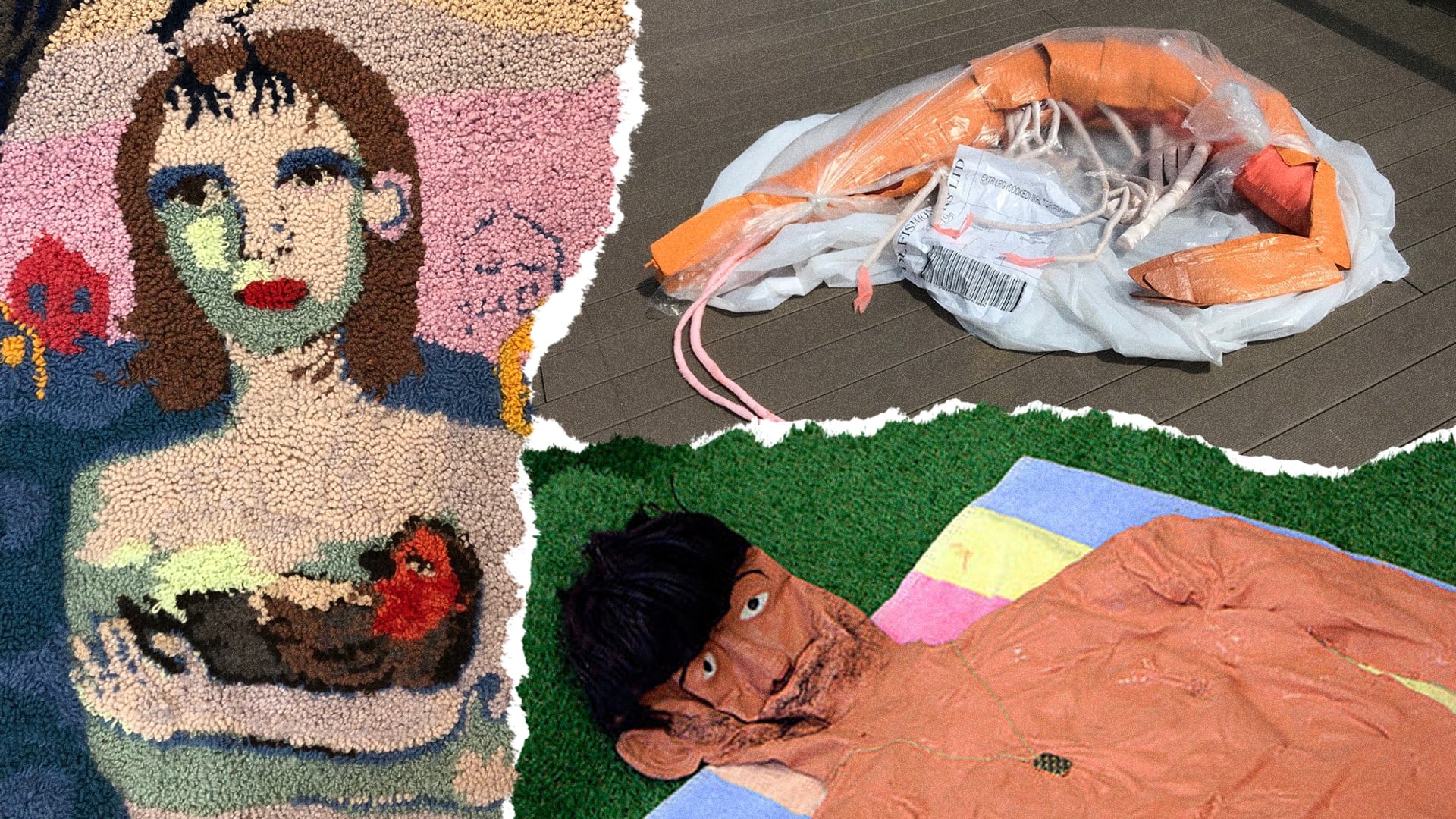

‘My process is repetitive so I go into this meditative state, which has turned my practice in to a healing one.’ – Selby Hurst Inglefield
During my graduation ceremony, we were shown a video montage of uplifting student sentiments praising their art school experience, cut between sickly motivational quotes such as ‘You are the future’. The entire five minutes was a clichéd reminder of how we are supposedly the new generation of groundbreaking creatives destined for ultimate success.
But watching this choppy, upbeat promo ad with a soundtrack pulled from a search for ‘Inspirational Instrumentals’ on YouTube brought only an internal, cringing anxiety towards the falsities surrounding this supposedly empowering future.
The reality after graduating consists of juggling multiple jobs, handling ample amounts of rejection, all the while managing an ongoing existential crisis surrounding your practice and what it all means outside of the comfortable, encouraging parameters of art school. I caught up with six of my fellow CSM graduates to uncover life after Uni.
–
JACK KELLY – @jackrobertkelly

Establishing trajectories for physical and digital interrogation, Jack’s work establishes a discourse between the fragilities of dimensional time and space.
How do you find a balance between work and making?
It’s very tough. Working takes up so much of my time. I’m doing my Masters course three days a week and working four days a week. At the moment the work life and art life don’t really go together for me. So I think you have to do it part-time to survive.

How important, if important at all, is being visible in your work as an artist?
When I started my BA I was also working out who I am as a person. So at that time, me being a visible part of my artwork was paramount. It’s interesting though to think that for art to be visible in a commercial sense, you have to be visible. It’s a funny paradox.
Do you feel like your work is changing now that you’re doing a Masters?
Going into an MA you have no funding. My practice is becoming more research-based as a result. You become very rational; if an experiment doesn’t work it s***s you up financially, which would mess my whole life up right now.
–
MARIA MAHFOOZ – @mariamahf_

Maria Mahfooz is a London-based multidisciplinary artist looking into themes of the self in relation to her bicultural identity as a visible Muslim woman of colour.
What happens to your new work after you’ve made it?
I try and market the s**t out of it and get as many likes on Instagram as I can. But I haven’t made anything new. There’s that degree of requirements for you to live; you need to have shelter, an income and then your emotional needs are met after. That’s the place I’m in.

How do you work around financing new work without the help of subsidised materials and student loans?
I’m lucky because I left Uni making video work which I’m still doing. But now I have a mental block; if there’s something I want to make in wood, I can’t because I don’t have a drill. Money isn’t a factor of whether the work is good or not but it really helps.
How do you view London as a city for emerging artists?
The opportunities are there but it’s very competitive. I’m fortunate enough to have a niche, and there is funding slowly going into that kind of art. But with that comes a dilemma: am I reducing my art and my practice down to that one thing because of funding?
–
HUGO HUTCHINS – @hugohutchins

Hugo’s practice investigates the simulated narratives and hyper-reality that is penetrating our ways of living.
What are the main factors that influence your practice, and have you found these shifting since graduating?
My work is about celebrity culture and popular culture. Personal circumstances can affect my process. There’s a conversation between artists about how if you’re not making work about your own identity, then how do you navigate making work about something else?

How has going straight into an MA altered your ways of working?
I haven’t made any work. So that’s altered. I need to be able to feel settled to make work. And you always compare yourself to others; there’s a guy in his fifties but he’s got boxes of stuff in his studio, it’s like an art shop. And I’m just there with nothing on my table.
Do you feel affected as a sculptor by competition from more commercially viable 2D work?
One hundred percent. At my master’s there’s a huge pressure on making sculpture sustainable. But 2D work is easier to make, cheaper and more commercial. Everyone has a wall in their house but not everyone has space for a sculpture.
–
RUBY DALZIEL – @ruby.isobela

Ruby’s practice seeks to represent how she reacts to the influx of intense visual stimuli in the city climate, responding to how we are competitively sold the idea of ‘luxury’.
Where do you see your practice progressing in the future?
I’ve moved back home to Nottingham which has put my degree into perspective. My approach and perspective on the world will always be influenced by my art school experience. But in reality, I’ve potentially decided against purely pursuing my practice.

Did you find your degree show a helpful or hindering point in beginning to develop your practice outside of art school?
During degree show especially, you’re in a bubble of making things and people being interested. Being an artist requires a huge amount of time in the dark. You think that everyone has the same end goal. But it’s actually about “who really wants this?”
Name 3 things art school never taught you:
- How to handle super-rich and out-of-touch ‘art’ people in the real world.
- What our £9000 a year was spent on.
- How to remain optimistic when so many of your peers don’t seem as engaged as you.
–
SELBY HURTST INGLEFIELD – @selby_hi

Selby’s practice is currently textiles based. Her artwork focuses on themes of storytelling, autobiography, and fantasy.
What’s your step-by-step process of making new work?
I start with writings which become a surreal in-between of life and make-believe. From these, I create drawings, which form the basis for the tapestries. My process is repetitive so I go into this meditative state, which has turned my practice in to a healing one.
What’s the most challenging part of working without a studio?
Space and storage is probably the biggest issue. I didn’t realise how much space my materials took up until it was all in my room. I find the lack of feedback quite challenging. Someone told me recently that they paid for a ‘Crit’ (critical assessment of a student’s work), which I think is crazy.
Do you see it as important for your side job to be art-based and creative?
I don’t think it’s really important but I think it has the potential to be more worthwhile. I think the main reason why I haven’t found one is because they’re difficult to find and they’re really competitive. Partly, I’m a bit intimated too.
–
GRACE BLACK – @greezyblack

Grace’s practice explores the point at which one thing can become another, and the instability of the definition made between organic and inorganic, alert and inert, us and it.
What are your feelings regarding unpaid work in exchange for ‘experience’ or portfolio building?
If you’re working for a gallery, company or an institution and they’re not paying you, you’re being exploited, hands down. It’s unfair to the people who can’t afford to take unpaid work. It’s part of the reason why it’s so hard to be working class and an artist.

Does making work at home affect the finished product?
I’ve been making work at home and found that what you make takes on the scale of the place that you make it in. I started working in my garden recently. It’s good to work in a space that isn’t your room because it changes how you feel about that space.
What’s your advice for curing post-degree-show blues?
Mine haven’t hit yet. My tips for preventing post-degree show blues is to get four part-time jobs and have a nervous breakdown because you’re so busy. And then you won’t be thinking about the degree show or the rest of it. Yay.


